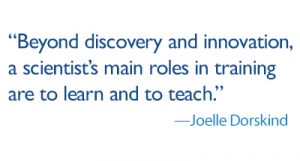I recently lost a mentor of mine. Jeff Nye, vice president of neuroscience innovation and scientific partnership strategy at Johnson & Johnson Innovation, passed away in March, due to cancer. I’ve known Jeff since I was born, but it wasn’t until I was in college, seeking a career path, that he became my mentor. Jeff guided me through summer internships, counseled me when I was deciding between science and medicine, and celebrated with me when I was admitted to the Cellular and Molecular Medicine Program at Johns Hopkins, chose my thesis lab and passed my graduate qualification exam.
Losing Jeff made me realize the importance of mentors and how their influence and guidance have contributed to where I am today.
What is a mentor? In graduate school, our primary mentors are our principal investigators (PIs), who guide our thesis work. However, prior to graduate school, Ph.D. students generally have had several other advisers who helped direct them to graduate school and often continue to support them in our post-Ph.D. careers. When Jeff died, I stopped to think of how important his influence had been on my life, on others who led me towards him, and on the people who continue to guide me in his absence.
Science is one of the most selfless careers you can pursue. Beyond discovery and innovation, a scientist’s main roles in training are to learn and to teach. This made me wonder: Besides my parents, who were my first mentors? When did my training as a scientist actually begin?
I’m reasonably sure it dates back to my 10th grade AP chemistry class, taught by a 7-foot genius named Mr. Grodski. The class wasn’t just 40 minutes out of my day; it became an extracurricular activity, as it required after-school help and weekend study groups with my classmates.
The Wednesday before Thanksgiving break, Mr. Grodski gave us an exam made up of questions from past AP tests. This was extremely challenging, but he encouraged us to take our time, and he meant it—literally. It wasn’t until I took a break that I realized that it was past 5 p.m. (school let out at 2:15). Of course, I had several voicemails and frantic text messages from my parents wondering where I was the day before vacation. Mr. Grodski stayed with the class until 7 p.m., when the majority of us finally finished the exam. He challenged me and believed in me. He also provided me with an environment to explore science, which inspired my passion for discovery.
While most Ph.D. candidates can pinpoint that moment, teacher, or boss that/who inspired them to pursue this path, many cannot. Some find themselves mentor-less or unsure of what a mentor truly is. How many mentors does one need? Can you have too many mentors? When you move on from an institution, does that mentor remain your mentor? I’m still so early in my thesis work and scientific career that I’m still trying to figure all this out. But I do know that mentors can last a lifetime, as was the case with Jeff. I’ve also found that mentors can be individuals you interact with daily; friends whom you admire; or someone you exchange emails with occasionally.
It’s important to remember that mentorship in science must be bidirectional. In the case of the PI-student relationship, it’s easier to see the give and take—I take advice from my PI and deliver data in return. But what about Jeff Nye or Mr. Grodski? What could I possibly give back to these mentors for whom I do not work and rarely see? They trained me and devoted time and effort to making me the dedicated scientist I hope to become. In return, I’ve updated them.
So, when a pivotal event in my career happens, I always share. Whether it’s a publication or passing my oral exam, I want my mentors to know that I credit them for helping me get there. Rarely are papers published with single authors, and rarely are labs run by a single individual. Science is the most selfless career I can think of, and I’m so excited to be a part of it.
